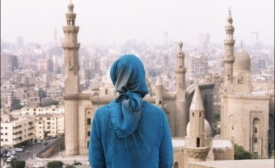middle east
Young Iranians today have more access to American cultural products than ever before [...] In his new book, After the American Century: The Ends of U.S. Culture in the Middle East, Brian Edwards writes how popular, cinema, literary, digital, and academic culture from the U.S. reaches North Africa and the Middle East, is stripped of its Americanness, and is recontextualized in a different light.

The billions spent in educating Saudi women will be another country’s gain.
How a Saudi comedian is promoting the country to YouTube audiences even as he criticizes it.
The Global Center for Sport Diplomacy, [...] is focused on using sports to connect people and empower them with confidence, health and wellness, and visibility. "For women and girls in particular, sport can build confidence, and for those with disabilities it can do that and more," Mushett said.
While much is made of Iran’s hard power, the recent nuclear deal hints at the prospect of the country’s untapped soft power being far more central to its long-term success in the 21st century. As the 13th-century Persian poet, Jalal ad- Din Muhammad Rumi, wrote: “Raise your words, not voice. It is rain that grows flowers, not thunder.”
For Nairobi’s commuters, summer has brought more woes than usual. [...] there has been an almost weekly shutdown as foreign VIPs fly in. [...] an increasing number are from the Middle East, their visits underlining a dramatic twist in the centuries-old battle between foreign powers for influence, trade, resources and military assets in a strategically sensitive part of the world.
Though the Taliban has relied on technology for over a decade in the name of propaganda and public relations, its relationship with social media has only taken root in the last few years, in parallel with the rise of ISIS. Just as terrorist organizations in the Middle East have made Facebook pages, Telegram channels, and Twitter accounts, the Taliban has expanded the breadth and depth of its outreach to the international community in general and the news media in particular.
They called it Think Again, Turn Away. The concept? Use sarcasm as way to turn Islamic State images into an argument against their grim techniques of terror. The creator and producer? The U.S. State Department. Today, everyone agrees the message was worse than ineffective. It played right into the hands of the terrorists.







